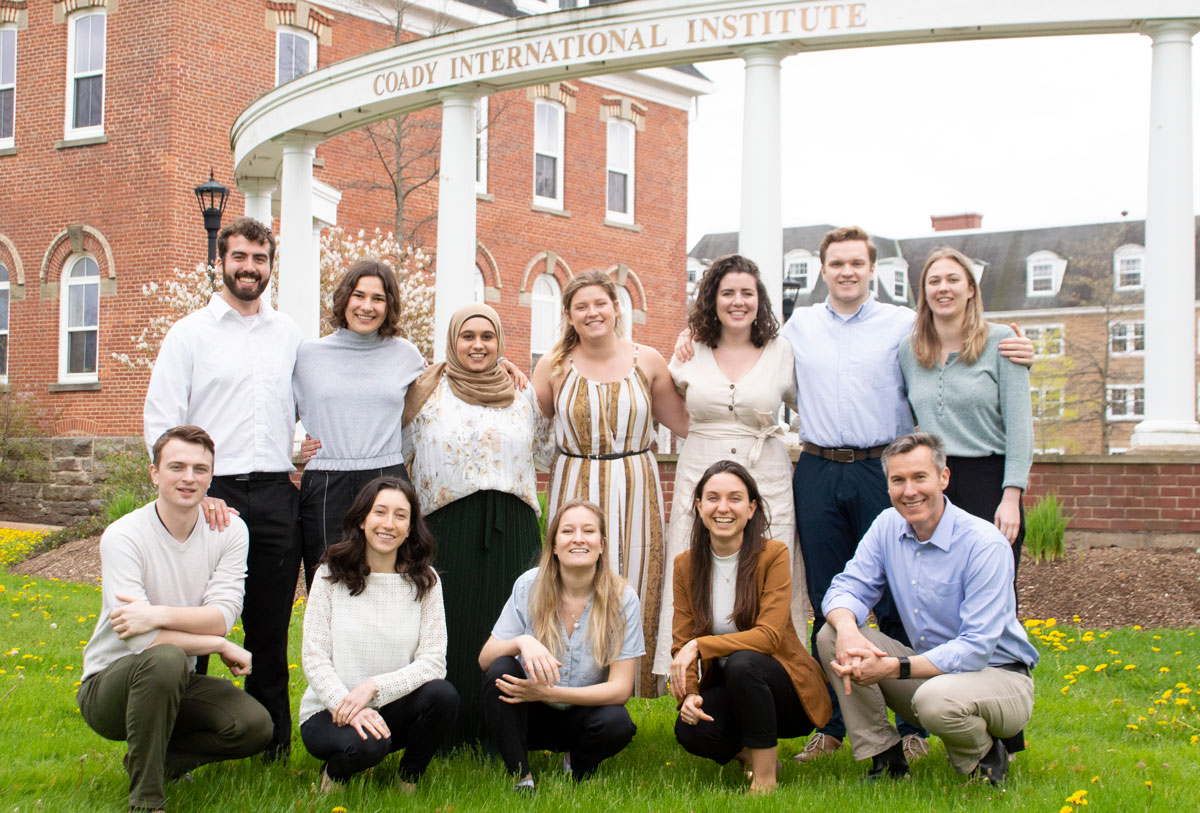From beekeeping in Botswana to addressing homelessness in Canada – nine recent university graduates have begun a journey of community-based leadership through Coady’s yearlong OceanPath Fellowship.
I saw how people are falling through the cracks and not connecting with different services. I realized I had this huge passion for working with people who are experiencing homelessness.
This year’s cohort recently completed Foundations for Community Change (FCC), a three-week experiential learning component delivered on-campus at Coady International Institute, located at StFX University. The fellows learn about Coady’s approach to development, complete self-assessments and analyses of leadership styles, and develop new skills through personal coaching sessions, working equitably with communities, and participatory project planning.
“I think it’s been a really incredible journey,” Stewart Langley says, “I never thought that you could pack so much into two or three weeks.”
For his community initiative, Stewart will work with Ryandale Transitional Housing in Kingston, Ontario, Canada, to develop collaborative solutions for chronic homelessness. Stewart moved to the community of Kingston when he began his studies at Queen’s University. He now holds a degree in Life Science with a minor in Spanish and Latin American Studies. It was through volunteer work that he first connected with his partner organization.
“I saw how people are falling through the cracks and not connecting with different services,” he says. “I realized I had this huge passion for working with people who are experiencing homelessness.”
… one of the biggest benefits of the last few weeks has been delving into the complexities from a more positive and optimistic angle … understanding that there is a role for asset-based community development.
Queen’s graduate Jessica Franko has a degree in Global Development and Politics Studies. She had returned from an internship opportunity provided by her university when she decided to apply for the fellowship.
While interning in Maun, Botswana with Travel for Impact, Jessica helped develop a proposal to strengthen the beekeeping network by incorporating it into the tourism value chain – the largest growing sector in Botswana’s economy. Now, with the support of the Oceanpath Fellowship, she is able to return to Botswana to implement the strategy she helped design.
“I knew that somehow I needed to go back because my time learning in Botswana is not done yet,” Jessica says. “I’m ready to go back. I’ve been waiting to go back.”
As the fellows complete the FCC phase, they will return home to develop their initiatives during the pre-community planning phase before returning to Coady for a final planning workshop. Then, each fellow will embark on a nine-month community phase where they implement their initiatives
“I feel better prepared to be going into this experience after this phase,” Jessica says.
“I’m most excited to work through some really tough questions that have come up throughout this experience. We’ve uncovered some pretty deep parts of our thinking and leadership styles, and to be reflective on that and how it’s going to influence the community-phase of this experience, is something that I’m very committed to unravelling more before I actually get into community.”
Because her university studies focused on development, and after interning in the community she will now return to, Jessica thought she knew what was in store when she arrived at Coady to begin the fellowship.
“I don’t think it was what I expected,” she says, “I think [I expected] something more along the lines of what I studied at Queen’s, and it’s just completely turned that upside-down for me, which has been pretty incredible.”
Both Stewart and Jessica note that Coady’s asset-based approach to development was a turning point for them.
“Coming from such a critical educational lens on development, one of the biggest benefits of the last few weeks has been delving into the complexities from a more positive and optimistic angle – you know, understanding that there is a role for asset-based community development,” says Jessica.
“You spend a lot of time working on ‘who are we?’, ‘what is our role in community?’, ‘how do I go into the community and find the assets?’ It really exceeded all of my expectations,” Stewart adds. “I didn’t realize that this is what I needed to do right now.”
The Pathy Family Foundation supports each fellow with up to $40,000 to cover the costs of their community initiative.
“I just feel so lucky and privileged,” Stewart says, “It’s a once in a lifetime opportunity and I wake up every morning and feel so grateful that I have been given this really great gift.”
“I don’t think I’ve ever had anyone really invest this much in my personal growth,” Jessica adds. “Making sure that we are setting ourselves up for personal and professional success along the way.”
Both fellows emphasize the importance of being surrounded by peers who support each other as they all strive for social change, and that the community they’ve built in a short few weeks between peer fellows, facilitators, staff, and partner-organizations all contribute greatly to their ability to grow and succeed.
“It is challenging. We do have to put in work. But it’s not just this stress that you have to perform or impress someone,” Stewart says, “it’s just bringing out the best side of us and I think in that sense that the people at Coady really lead by example.”
“We start every morning together as a community with gratitude,” Jessica adds, “and there’s so much to be grateful for in this experience.”

